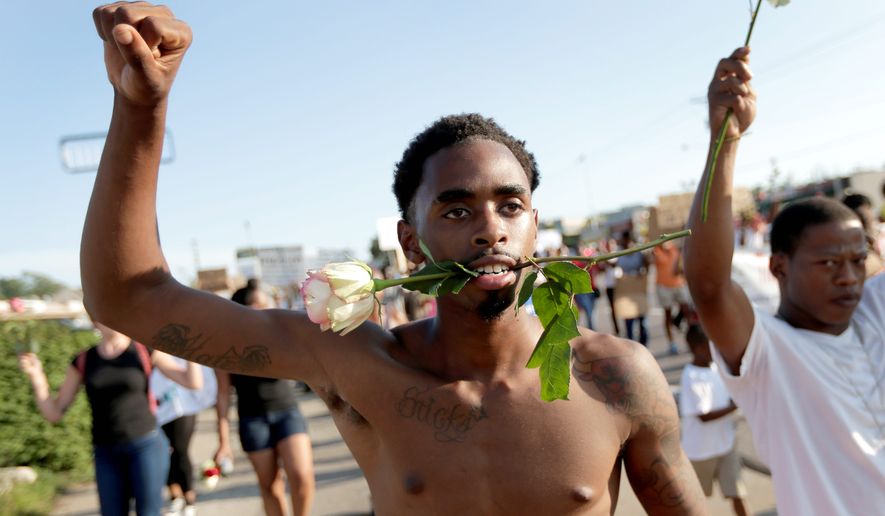Tensions in Ferguson, Missouri, simmered Tuesday ahead of a scheduled visit from U.S. Attorney General Eric H. Holder Jr. and as prosecutors prepared to present evidence to a grand jury in the shooting death of an unarmed black teenager by a white police officer.
Mr. Holder was set to travel to the region Wednesday to meet with investigators who are working on a separate federal civil rights investigation into the circumstances surrounding the Aug. 9 shooting of 18-year-old Michael Brown, which has triggered more than a week of protests, dozens of arrests and angry confrontations between residents and law enforcement officials in the area.
In a piece published in The St. Louis Post-Dispatch ahead of his visit, Mr. Holder said hundreds of people had already been interviewed and federal medical examiners completed their autopsy Monday.
“At a time when so much may seem uncertain, the people of Ferguson can have confidence that the Justice Department intends to learn — in a fair and thorough manner — exactly what happened,” he wrote.
Mr. Holder asked for cooperation and patience from the public and said the investigation would be full, fair and independent.
“And beyond the investigation itself, we will work with the police, civil rights leaders, and members of the public to ensure that this tragedy can give rise to new understanding — and robust action — aimed at bridging persistent gaps between law enforcement officials and the communities we serve,” he wrote. “Long after the events of Aug. 9 have receded from the headlines, the Justice Department will continue to stand with this community.”
A spokesman for the prosecuting attorney in the case told multiple outlets that prosecutors would begin presenting evidence to a grand jury Wednesday, though it was still unclear what crime Ferguson city police Officer Darren Wilson might be charged with — or whether there would be enough evidence to bring charges.
Eyewitness accounts suggested Mr. Brown was trying to surrender before Officer Wilson shot him, and a military-style presence from law enforcement officials has inflamed tensions in the community of approximately 22,000 since the incident.
Though residents were already unlikely to heed the advice anyway, Ferguson city leaders issued a statement Tuesday urging people to stay in their homes at night.
“It is our hope that as we continue to work for the well-being of Ferguson, residents will stay home at night, allow peace to settle in, and allow for the justice process to take its course,” the statement read.
Tensions flared Tuesday afternoon when a St. Louis police officer fatally shot a 23-year-old black man wielding a knife who was acting erratically, a few miles from the street where Mr. Brown was shot.
“I think we can all understand what’s going on in Ferguson, but I think every police officer that’s out here has a right to defend themselves and the community,” St. Louis Police Chief Sam Dotson said.
Many in the community have also called for Officer Wilson to be charged with murder.
Richard G. Callahan, U.S. attorney for the Eastern District of Missouri, told Time magazine the investigation is proceeding smoothly but that presenting evidence to a grand jury could take weeks, or even months.
A grand jury was set to hear evidence Wednesday, according to Ed Magee, a spokesman for St. Louis County prosecutor Bob McCulloch.
A separate ongoing investigation is being conducted by Mr. Holder’s Justice Department, which also took the extraordinary step of conducting its own autopsy after an initial one performed by the local medical examiner and a private one performed at the request of Mr. Brown’s family.
The confluence of events has triggered racial tensions simmering in the mostly black community.
President Obama has trod carefully, urging both protesters and law enforcement to behave peacefully going forward and saying he has to be careful not to prejudge events before investigations are completed.
“But as I think I’ve said in some past occasions, part of the ongoing challenge of perfecting our union has involved dealing with communities that feel left behind, who, as a consequence of tragic histories, often find themselves isolated, often find themselves without hope, without economic prospects,” Mr. Obama said Monday.
• David Sherfinski can be reached at dsherfinski@washingtontimes.com.




Please read our comment policy before commenting.